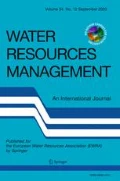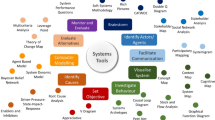Abstract
Freshwater resources might become the most limited resource in the future due to rising demands, climate change, and the degradation of aquatic ecosystems. While the urgency of this challenge is uncontested, water governance regimes still struggle to employ suitable responses. They lack of: taking a comprehensive perspective on water systems; focusing on social actors, their actions, needs, intentions, and norms as drivers of water systems; engaging in a discourse on tangible goals to provide direction for governance efforts; and promoting a comprehensive perspective on water sustainability that equally recognizes depletion, justice, and livelihood issues in the long-term. We present an approach that intends to overcome these limitations by putting the focus on what people do with water, and why, along with the impacts of these doings. First, we outline an integrated approach to water governance regimes, and then, we present a holistic set of principles by which to evaluate sustainable water governance. Solution-oriented research applying this approach integrates natural sciences and engineering perspectives on water systems with social science studies on water governance, while also specifying and applying normative principles for water sustainability. The approach we develop herein can be used to reform and innovate existing water governance regimes as well as stimulate transformative governance research.



Similar content being viewed by others
Notes
Local stressors such as regional policies and local climatic conditions (e.g., droughts) are considered within the system; see interfaces above.
References
Alcott B (2005) Jevon’s paradox. Ecol Econ 54(1):9–21
Alley WM, Leake SA (2004) The journey from safe yield to sustainability. Ground Water 42(1):12–16
Balkema JJ, Preisig HA, Otterpohl R, Lambert FJD (2002) Indicators for the sustainability assessment of wastewater treatment systems. Urban Water 4:153–161
Belausteguigoitia JC (2004) Causal chain analysis and root causes: the GIWA approach. Ambio 33:7–12
Binder CB, Hofer C, Wiek A, Scholz RW (2004) Transition towards improved regional wood flows by integrating material flux analysis and agent analysis: the case of Appenzell Ausserrhoden, Switzerland. Ecol Econ 49:1–17
Boone CG (2008) Environmental justice as process and new avenues for research. Environ Justice 1(3):149–154
Braden JB, Brown DG, Dozier J, Gober P et al (2009) Social science in a water observing system. Water Resour Res 45:W11301
Conca K (2008) The United States and international water policy. J Environ Dev 17:215–237
Furlong K, Bakker K (2010) The contradictions in “alternative” service delivery: governance, business models, and sustainability in municipal water supply. Environ Plann C Govern Pol 28:349–368
Gibson RB (2006) Sustainability assessment. Impact Assess Proj Apprais 24:170–182
Gober P, Kirkwood CW, Balling RC, Ellis AW, Deitrick S (2010) Water planning under climatic uncertainty in Phoenix: why we need a new paradigm. Ann Assoc Am Geogr 100(2):356–372
Gober P, Wentz EA, Lant T, Tschudi MK, Kirkwood C (2011) WaterSim: a simulation model for urban water planning in Phoenix, Arizona, USA. Environ Plann Plann Des 38(2):197–215
Godfray HCJ, Beddington JR, Crute IR, Haddad L et al (2010) Food security: the challenge of feeding 9 billion people. Science 327:812–818
Grigg NS (2010) Governance and management for sustainable water systems. IWA Publishing, London
Gruber JS (2010) Key principles of community-based natural resource management: a synthesis and interpretation of identified effective approaches for managing the commons. Environ Manage 45:52–66
Hedelin B (2007) Criteria for the assessment of sustainable water management. Environ Manage 39:151–163
Hellstrom D, Jeppsson U, Karrman E (2000) A framework for systems analysis of sustainable urban water management. Environ Impact Assess Rev 20:311–321
Jacobs KL, Holway JM (2004) Managing for sustainability in an arid climate: lessons learned from 20 years of groundwater management in Arizona, USA. Hydrol J 12:52–65
Kallis G, Kiparsky M, Milman A (2006) Glossing over the complexity of water. Science 314(5804):1387–1388
Kiker GA, Bridges TS, Varghese A, Seager TP, Linkov I (2005) Application of multicriteria decision analysis in environmental decision making. Integr Environ Assess Manag 1(2):95–108
Kuzdas C, Warner B, Wiek A, Vignola R (2011) Systemic analysis and sustainability appraisal of water governance in Guanacaste, Costa Rica. Working Paper, Arizona State University, Tempe, AZ
Lach D, Rayner S, Ingram H (2005) Taming the waters: strategies to domesticate the wicked problems of water resource management. Int J Water 3(1):1–17
Langsdale SM, Beall A, Carmichael J, Cohen SJ, Forster CB, Neale T (2009) Exploring the implications of climate change on water resources through participatory modeling: case study of the Okanagan Basin, British Columbia. J Water Resour Plann Manage 135(5):373–381
Larsen TA, Gujer W (1997) The concept of sustainable urban water management. Water Sci Technol 35(9):3–10
Larson KL, Lach D (2010) Equity in urban water governance through participatory, place-based approaches. Nat Resour J 50(2):407–430
Larson KL, Wiek A, Withycombe L (2011) Water governance and sustainability in Phoenix, Arizona. Working Paper, Arizona State University, Tempe, AZ
Lebel L, Garden P, Imamura M (2005) The politics of scale, position, and place in the governance of water resources in the Mekong region. Ecol Soc 10(2):18
Lockwood M, Davidson J, Curtis A, Stratford E, Griffith R (2010) Governance principles for natural resource management. Soc Nat Resour 23(10):986–1001
Lubell M, Leach W, Sabatier PA (2008) Collaborative watershed partnerships in the epoch of sustainability. In: Mazmanian D, Kraft ME (eds) Toward sustainable communities, 2nd edn. The MIT Press, Cambridge, pp 255–288
Ludwig D (2001) The era of management is over. Ecosystems 4:758–764
Lundin M, Morrison GM (2002) A life cycle assessment based procedure for development of environmental sustainability indicators for urban water systems. Urban Water 4(2):145–152
Maas A (2011) Water, Governance and Sustainability: A Case Study of Water Allocation in Whiteman’s Creek Watershed, Ontario. Master Thesis, University of Waterloo
Martinez SE, Escolero O, Wolf L (2011) Total urban water cycle models in semiarid environments—quantitative scenario analysis at the area of San Luis Potosi, Mexico. Water Resour Manag 25(1):239–263
Marttunen M, Suomalainen M (2005) Participatory and multi objective development of water course regulation—creation of regulation alternatives from stakeholders’ preferences. J Multi Crit Decis Anal 13(1):29–49
Mulder K, Hagens N, Fisher B (2010) Burning water: a comparative analysis of the energy return on water invested. Ambio 39:30–39
Overpeck J, Udall B (2010) Dry times ahead. Science 328(5986):1642–1643
Ostrom E (2009) A general framework for analyzing sustainability of social-ecological systems. Science 325:419–422
Pahl-Wostl C (2009) A conceptual framework for analyzing adaptive capacity and multi-level learning processes in resource governance regimes. Glob Environ Chang 19(3):354–356
Pahl-Wostl C, Holtz G, Kastens B, Knieper C (2010) Analyzing complex water governance regimes: the management and transition framework. Environ Sci Pol 13(7):571–581
Parkes MW, Morrison KE, Bunch MJ, Hallstrom LK, Neudoerffer RC et al (2010) Towards integrated governance for water, health, and social-ecological systems: the watershed governance prism. Glob Environ Chang 20(4):693–704
Quay R (2010) Anticipatory governance. J Am Plann Assoc 76(4):1–16
Reed P, Kasprzyk J (2009) Water resources management: the myth, the wicked, and the future. J Water Resour Plann Manag 135:411–413
Rockström J, Steffen W, Noone K, Persson A, Chapin FS et al (2009) A safe operating space for humanity. Nature 461:472–475
Rogers P, Hall AW (2003) Effective Water Governance. TEC Background Papers No. 7. Global Water Partnership, Stockholm.
Schwarzenbach RP, Escher BI, Fenner K, Hofstetter TB, Johnson CA, von Unten U, Wehrli B (2006) The challenge of micropollutants in aquatic systems. Science 313:1072–1077
Sophocleous M (2000) From safe yield to sustainable development of water resources—the Kansas experience. J Hydrol 235:27–43
Turner BL, Kasperson RE, Matson P, McCarthy JJ, Corell RW et al (2003) A framework for vulnerability analysis in sustainability science. Proc Natl Acad Sci 100(14):8074–8079
White DD, Wutich AY, Larson KL, Gober P, Lant T, Senneville C (2010) Credibility, salience, and legitimacy of boundary objects for environmental decision making: water managers’ assessment of WaterSim—a dynamic simulation model in an immersive Decision Theater. Sci Public Pol 37(3):219–232
Winz I, Brierley G, Trowsdale S (2009) The use of system dynamics simulation in water resources management. Water Resour Manag 23(7):1301–1323
Acknowledgments
The authors would like to thank two anonymous reviewers helpful comments on previous versions of the article. We also would like to thank Lauren Withycombe, Danielle Shaffer, Sandra Rodegher, Adrienne Uphoff, and Christopher Kuzdas (School of Sustainability, Arizona State University) for research assistance. This article is based on work supported by the National Science Foundation under Grant SES-0345945, Decision Center for a Desert City. Any opinions, findings, and conclusions or recommendations expressed in this material are those of the authors and do not necessarily reflect the views of the National Science Foundation.
Author information
Authors and Affiliations
Corresponding author
Rights and permissions
About this article
Cite this article
Wiek, A., Larson, K.L. Water, People, and Sustainability—A Systems Framework for Analyzing and Assessing Water Governance Regimes. Water Resour Manage 26, 3153–3171 (2012). https://doi.org/10.1007/s11269-012-0065-6
Received:
Accepted:
Published:
Issue Date:
DOI: https://doi.org/10.1007/s11269-012-0065-6




